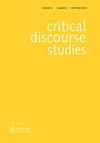求助PDF
{"title":"一种“有吸引力的权力行使方式”?揭示新冠肺炎大流行期间女性国家元首形象中隐藏的性别意识形态","authors":"Carolin Debray, S. Schnurr, Joelle Loew, Sophie Reissner-Roubicek","doi":"10.1080/17405904.2022.2101499","DOIUrl":null,"url":null,"abstract":"This paper explores the gendered discourses of the–seemingly favourable–media coverage that certain Heads of State received for their handling of the COVID-19 pandemic. Looking at media reports published in different English-speaking outlets in the US, the UK, India, Bangladesh, Singapore, New Zealand, Australia, and Ireland, and using multimodal feminist critical discourse analysis, we identify and describe strategies that on the surface appear to challenge hegemonic–and largely masculine–discourses of leadership. Upon closer scrutiny, these superficially complimentary reports rather reinforce and naturalise discriminatory gender ideologies, and, as we demonstrate, they do so to different degrees along a continuum of essentialising, contextualising, and problematising. We critically discuss the discursive and visual processes involved and show that complimenting these leaders on their performance compares them against a masculine norm to construct their leadership as ‘alternative', exceptional, and hence marked. This gendered portrayal of political leadership in times of crisis illustrates how the discursive construction of identities, responsibilities, and relationships during COVID-19 largely hinges on power relations and political ideologies that systematically disadvantage and undermine women. The purportedly positive form in which this occurs makes it particularly difficult to challenge and subvert these discriminatory discourses and their underlying gendered ideologies. © 2023 The Author(s). Published by Informa UK Limited, trading as Taylor & Francis Group.","PeriodicalId":46948,"journal":{"name":"Critical Discourse Studies","volume":" ","pages":""},"PeriodicalIF":1.5000,"publicationDate":"2023-01-23","publicationTypes":"Journal Article","fieldsOfStudy":null,"isOpenAccess":false,"openAccessPdf":"","citationCount":"0","resultStr":"{\"title\":\"An ‘attractive alternative way of wielding power’? Revealing hidden gender ideologies in the portrayal of women Heads of State during the COVID-19 pandemic\",\"authors\":\"Carolin Debray, S. Schnurr, Joelle Loew, Sophie Reissner-Roubicek\",\"doi\":\"10.1080/17405904.2022.2101499\",\"DOIUrl\":null,\"url\":null,\"abstract\":\"This paper explores the gendered discourses of the–seemingly favourable–media coverage that certain Heads of State received for their handling of the COVID-19 pandemic. Looking at media reports published in different English-speaking outlets in the US, the UK, India, Bangladesh, Singapore, New Zealand, Australia, and Ireland, and using multimodal feminist critical discourse analysis, we identify and describe strategies that on the surface appear to challenge hegemonic–and largely masculine–discourses of leadership. Upon closer scrutiny, these superficially complimentary reports rather reinforce and naturalise discriminatory gender ideologies, and, as we demonstrate, they do so to different degrees along a continuum of essentialising, contextualising, and problematising. We critically discuss the discursive and visual processes involved and show that complimenting these leaders on their performance compares them against a masculine norm to construct their leadership as ‘alternative', exceptional, and hence marked. This gendered portrayal of political leadership in times of crisis illustrates how the discursive construction of identities, responsibilities, and relationships during COVID-19 largely hinges on power relations and political ideologies that systematically disadvantage and undermine women. The purportedly positive form in which this occurs makes it particularly difficult to challenge and subvert these discriminatory discourses and their underlying gendered ideologies. © 2023 The Author(s). Published by Informa UK Limited, trading as Taylor & Francis Group.\",\"PeriodicalId\":46948,\"journal\":{\"name\":\"Critical Discourse Studies\",\"volume\":\" \",\"pages\":\"\"},\"PeriodicalIF\":1.5000,\"publicationDate\":\"2023-01-23\",\"publicationTypes\":\"Journal Article\",\"fieldsOfStudy\":null,\"isOpenAccess\":false,\"openAccessPdf\":\"\",\"citationCount\":\"0\",\"resultStr\":null,\"platform\":\"Semanticscholar\",\"paperid\":null,\"PeriodicalName\":\"Critical Discourse Studies\",\"FirstCategoryId\":\"98\",\"ListUrlMain\":\"https://doi.org/10.1080/17405904.2022.2101499\",\"RegionNum\":2,\"RegionCategory\":\"文学\",\"ArticlePicture\":[],\"TitleCN\":null,\"AbstractTextCN\":null,\"PMCID\":null,\"EPubDate\":\"\",\"PubModel\":\"\",\"JCR\":\"Q2\",\"JCRName\":\"COMMUNICATION\",\"Score\":null,\"Total\":0}","platform":"Semanticscholar","paperid":null,"PeriodicalName":"Critical Discourse Studies","FirstCategoryId":"98","ListUrlMain":"https://doi.org/10.1080/17405904.2022.2101499","RegionNum":2,"RegionCategory":"文学","ArticlePicture":[],"TitleCN":null,"AbstractTextCN":null,"PMCID":null,"EPubDate":"","PubModel":"","JCR":"Q2","JCRName":"COMMUNICATION","Score":null,"Total":0}
引用次数: 0
引用
批量引用
An ‘attractive alternative way of wielding power’? Revealing hidden gender ideologies in the portrayal of women Heads of State during the COVID-19 pandemic
This paper explores the gendered discourses of the–seemingly favourable–media coverage that certain Heads of State received for their handling of the COVID-19 pandemic. Looking at media reports published in different English-speaking outlets in the US, the UK, India, Bangladesh, Singapore, New Zealand, Australia, and Ireland, and using multimodal feminist critical discourse analysis, we identify and describe strategies that on the surface appear to challenge hegemonic–and largely masculine–discourses of leadership. Upon closer scrutiny, these superficially complimentary reports rather reinforce and naturalise discriminatory gender ideologies, and, as we demonstrate, they do so to different degrees along a continuum of essentialising, contextualising, and problematising. We critically discuss the discursive and visual processes involved and show that complimenting these leaders on their performance compares them against a masculine norm to construct their leadership as ‘alternative', exceptional, and hence marked. This gendered portrayal of political leadership in times of crisis illustrates how the discursive construction of identities, responsibilities, and relationships during COVID-19 largely hinges on power relations and political ideologies that systematically disadvantage and undermine women. The purportedly positive form in which this occurs makes it particularly difficult to challenge and subvert these discriminatory discourses and their underlying gendered ideologies. © 2023 The Author(s). Published by Informa UK Limited, trading as Taylor & Francis Group.


